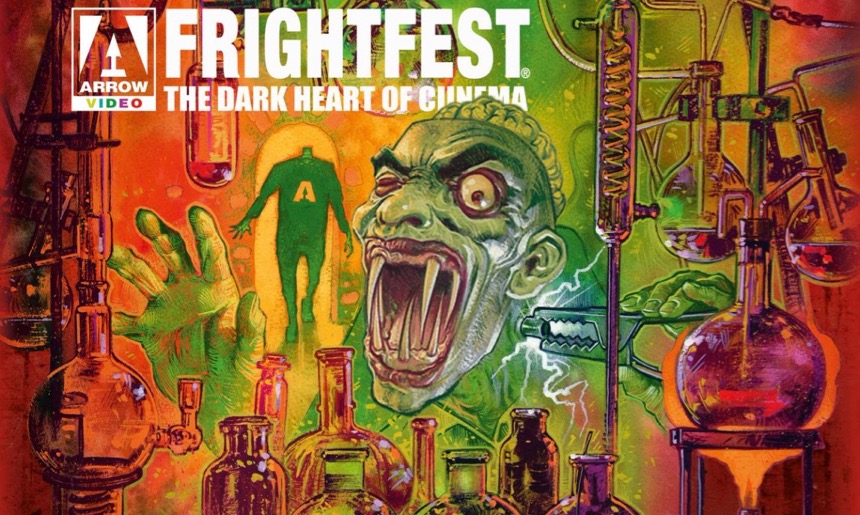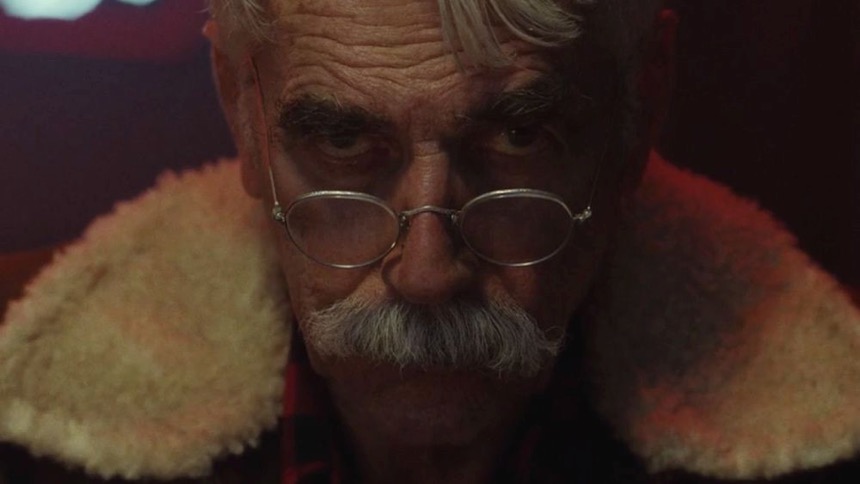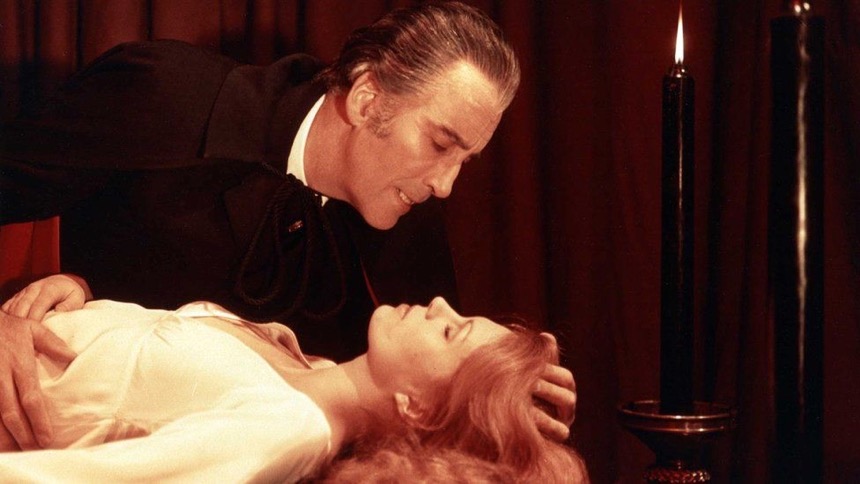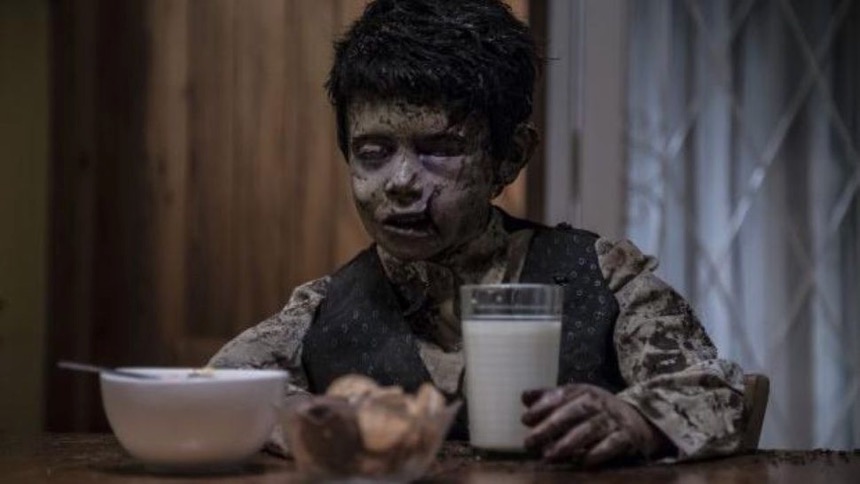Festival Diary: Arrow Video FrightFest Day 4 - THE MAN WHO KILLED HITLER AND THEN THE BIGFOOT, HAMMER HORROR: THE WARNER BROS YEARS, TERRIFIED

It was the penultimate day of FrightFest and the incessant rain did nothing to deter horror fans and genre aficionados from swarming back to Leicester Square for a fourth helping of cinematic excess. Sunday witnessed the English Premiere of John McPhail’s all-singing, all-dancing zombie high school musical Anna and the Apocalypse, while the wonderful Issa Lopez returned for an encore screening of her excellent Tigers are not Afraid. The singular talents of Joseph Khan were championed with the UK Premiere of his incendiary battle rap odyssey Bodied, while Andy Nyman and Jeremy Dyson put the willies up us once again with a special event screening of their excellent horror anthology, Ghost Stories.
But that was far from all…

The Man Who Killed Hitler and then the Bigfoot (Robert D. Krzykowski, USA) - European Premiere
Word had travelled across the pond following the world premiere of Krzykowski’s debut feature, that it had failed to deliver on the promise of its schlocky, tongue-in-cheek. What that means, however, is that audiences were prepared to embrace the film on its own, rather than its perceived, merits.
Barely a horror film at all, The Man Who Killed Hitler and then the Bigfoot is instead a hugely ambitious, character-focused epic that ponders the meaning of heroism and the burden of mythology. Sam Elliott is a towering presence as the brooding, lonesome Calvin Barr, who - rumour has it - assassinated the Fuhrer back in 1942. Leading a quiet, anonymous life some 45 years later, Barr is suddenly called upon to undertake a new, even more bizarre mission to save his country from an all-together different kind of threat.
Playing out more like a revisionist western in the mould of The Searchers or Unforgiven, the film explores how a nation’s heroes are built up, only to be discarded when no longer needed. It examines how ageing also plays its part in disarming a once accomplished man - and warrior - and how regret and loss gnaw away at us over time, and can only be silenced by our inevitable, final fate.
Undeniably, the film overreaches the confines of its budget, but the artificially created landscapes and details recall the intricate matte paintings so beloved by art historians. The supporting cast, which includes Caitlin FitzGerald (Masters of Sex), Ron Livingston and Aidan Turner as the young Barr, are immaculately turned out, while Alex Vendler’s gorgeous cinematography and a sweeping score from Joe Kraemer only add to the elegiac grandeur of this beautiful, haunting film.

Hammer Horror: The Warner Bros Years (dir. Marcus Hearn, UK) - World Premiere
Thanks to the recent efforts of Powerhouse Films, I have spent many an hour of late diving deep into the history of Hammer Films, often aided by the academic guidance of Kim Newman, Jonathan Rigby and more. Newman was on hand to introduce this new feature length documentary from official Hammer historian Marcus Hearn, which in turn features Rigby’s musings prominently. Produced by Kat Ellinger of Diabolique magazine, this film is very much in keeping with the style of those Indicator supplemental features - packed full of incredible insight and information, but perhaps not ideally suited for big screen.
That is not to say that Hearn’s latest offering was anything less that thoroughly entertaining - especially when seen with a roomful of similarly enthusiastic Hammer fans. The Warner Years sadly also coincided with the downturn in Hammer’s fortunes. Ever dependent on overseas financing, Hammer were beholden to their American investors, who increasingly demanded little more than Christopher Lee Dracula films.
As the face of American horror evolved, thanks to Night of the Living Dead and WB’s own The Exorcist, Hammer’s low budget victorian gothic tales became increasingly out of step with current tastes. Their efforts to correct this, in Dracula AD 1972, reeked of a critical disconnect between the producers and the youth market. In their desperation, oddities like The Legend of the 7 Golden Vampires - a co-production with Shaw Bros in Hong Kong - would emerge, but at the time still failed to find an audience. As Newman pointed out, it wouldn’t be until the arrival of Blade and Underworld in the late 90s, that horror and action would be recognised as profitable bedfellows.

Terrified (dir. Demian Rugna, Argentina) - UK Premiere
Finally a scary movie at FrightFest! Rugna sent in a hilarious video intro of his new horror film, in which his endearing promise that “You will scared!” became something of a whispered mantra that rippled through the auditorium as we settled back for the only genuinely frightening film I’ve seen at the festival so far.
Incorporating an ensemble of characters, who congregate around the strange goings on in a quiet suburban neighbourhood, Terrified details the investigation of a young boy’s accidental death, as well as the brutal murder of a neighbouring housewife at the hands of a fiercely malevolent supernatural force. As cops, scientists and civilians alike begin to hear bumps in the night and glimpse gangly spectral figures in the shadowy periphery, Rugna turns on the terror through a series of masterfully orchestrated jump scares and ghoulish reveals.
Often employing the same syntax as Asian horror, Terrified weaves an intricate web of timelines while remaining largely free of exposition. Evil forces have been unleashed, and little more explanation is necessary. What follows is a consistently breathless and unsettling exercise in good clean fear. Enjoy.
J Hurtado and Andrew Mack
contributed to this story.

Do you feel this content is inappropriate or infringes upon your rights? Click here to report it, or see our DMCA policy.






